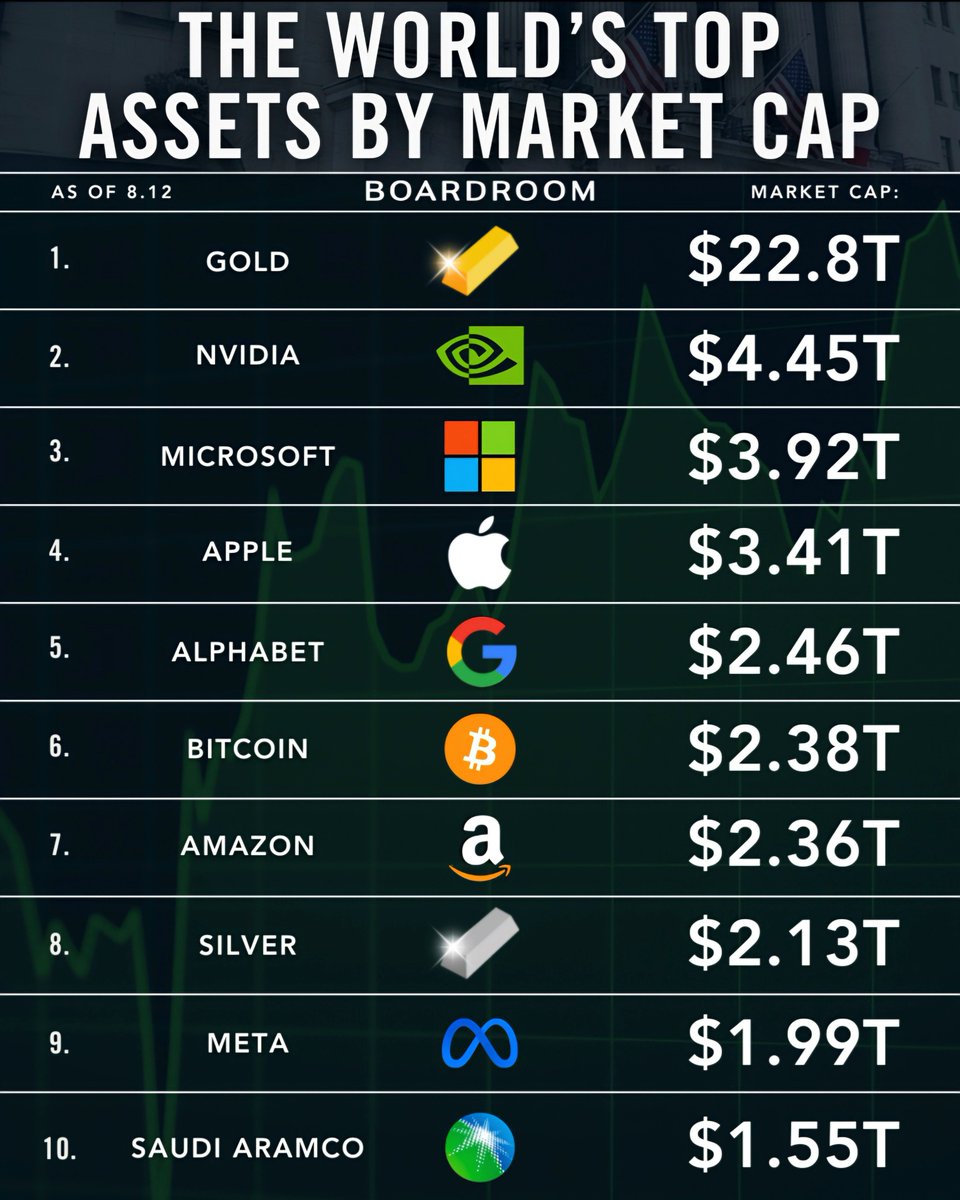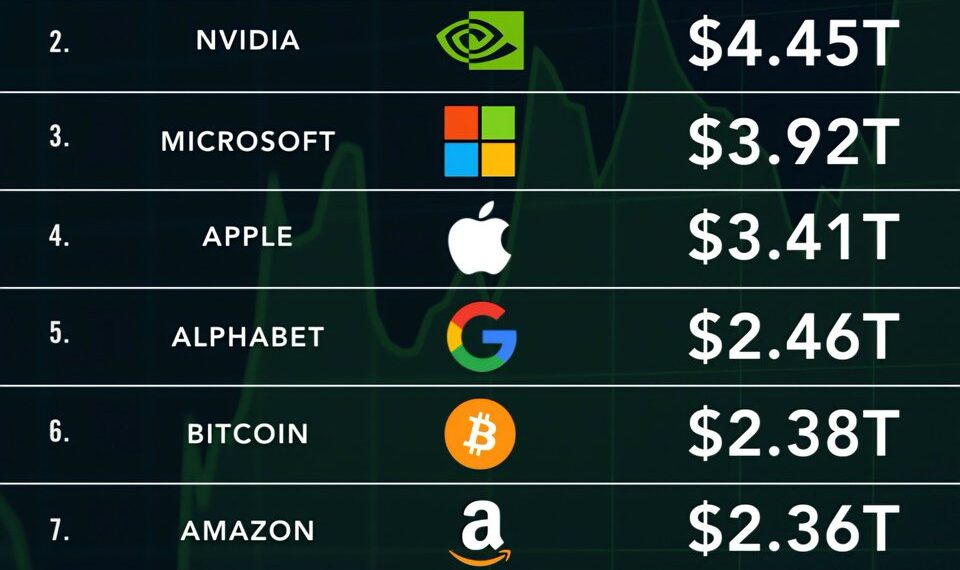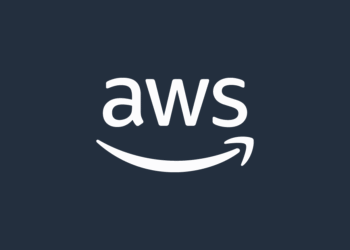Select Language:
The World’s Wealthiest Assets in 2025: A Closer Look

1. Apple Inc. — The Tech Giant’s Dominance Continues
Apple still ranks as the most valuable company globally, boasting a market capitalization of over $3.4 trillion in 2025. Its influence extends from consumer electronics to services like cloud computing, streaming, and financial technology. The brand’s innovation in augmented reality and wearable tech keeps it at the forefront, and its ecosystem’s loyalty fuels consistent revenue growth. Apple’s ability to adapt swiftly to emerging tech trends ensures its assets remain among the most valuable in the world.
2. Microsoft Corporation — Leading the Cloud and AI Revolution
With a market cap surpassing $2.8 trillion, Microsoft stands as a powerhouse in cloud computing, enterprise solutions, and AI development. Its Azure cloud platform captures a significant share of the global market, fueling the company’s valuation. Moreover, its strategic acquisitions, including gaming and enterprise software firms, bolster its long-term growth. Microsoft’s continued investment in innovative AI and quantum computing technologies solidifies its position as one of the world’s top assets.
3. Saudi Aramco — The Oil Titan Maintains Strength
Saudi Aramco remains one of the most valuable energy assets worldwide, valued at approximately $2.2 trillion. Despite the global pivot toward renewable energy, Aramco’s massive oil reserves and extensive pipeline infrastructure keep it highly profitable. The company’s increasingly diversified portfolio and investments in petrochemicals ensure it remains an essential component of the global energy landscape.
4. Amazon.com, Inc. — E-commerce & Cloud Empire
Amazon holds a market valuation of around $2.4 trillion, thanks to its dominance in e-commerce and cloud services through AWS. Its expansion into healthcare, logistics, and artificial intelligence underscores its versatility. With global logistics networks and a customer base exceeding 300 million, Amazon continues to grow its assets’ value through technological innovation and strategic acquisitions.
5. Alphabet Inc. (Google) — Leading in Search and Innovation
Google’s parent company, Alphabet, is worth over $2.1 trillion, primarily driven by advertising revenue, paid subscriptions, and investments in emerging tech like autonomous vehicles and AI research. Its dominance in digital advertising and expansive data centers underpin its market value. Alphabet’s diversified investment portfolio, including its ventures in health tech and cloud solutions, position it as a key global asset.
6. Tesla, Inc. — Pioneering Sustainable Transportation
Tesla’s market capitalization has soared past $900 billion. Its leadership in electric vehicles, renewable energy products, and battery tech has revolutionized transportation. Elon Musk’s vision and the company’s expanding manufacturing capacity increase its assets’ value daily. Tesla’s innovation pipeline, including autonomous driving and energy storage, ensures its ongoing prominence in the market.
7. Tencent Holdings — The Powerhouse in Asian Tech
With a valuation exceeding $600 billion, Tencent remains one of Asia’s most valuable assets. Known for its dominant social media and gaming platforms, Tencent has diversified into fintech, cloud computing, and AI. Its strategic investments in technology startups worldwide extend its influence, making it a vital player in the global digital economy.
8. Alibaba Group — The Leading Chinese E-Commerce Conglomerate
Alibaba’s market cap is estimated at around $540 billion. Its extensive e-commerce ecosystem, cloud computing services, and digital payments platform continue to grow rapidly. Despite regulatory pressures in China, Alibaba’s integrated business models and expansion into logistics and entertainment retain its status as a key global asset.
9. Visa Inc. — The Heartbeat of Global Payments
Visa has a valuation of nearly $480 billion, serving as a backbone for digital transactions worldwide. Its expansive network links millions of merchants and consumers, facilitating seamless cross-border payments. As digital commerce accelerates globally, Visa’s assets become increasingly vital to the world’s financial infrastructure.
10. LVMH Moët Hennessy Louis Vuitton — Luxury Brand Powerhouse
LVMH’s assets are valued at approximately $400 billion, driven by its portfolio of luxury brands spanning fashion, cosmetics, wines, and spirits. The continued global appetite for luxury goods, especially in emerging markets, sustains its substantial asset base. Its innovative marketing and product strategies keep it at the top of the luxury sector.
In 2025, the diversity and innovation within these assets highlight the evolving landscape of global wealth, emphasizing technology, energy, and luxury industries’ resilience and growth potential. Each of these companies and assets demonstrates how strategic investments and pioneering technologies shape the world’s economic hierarchy.






